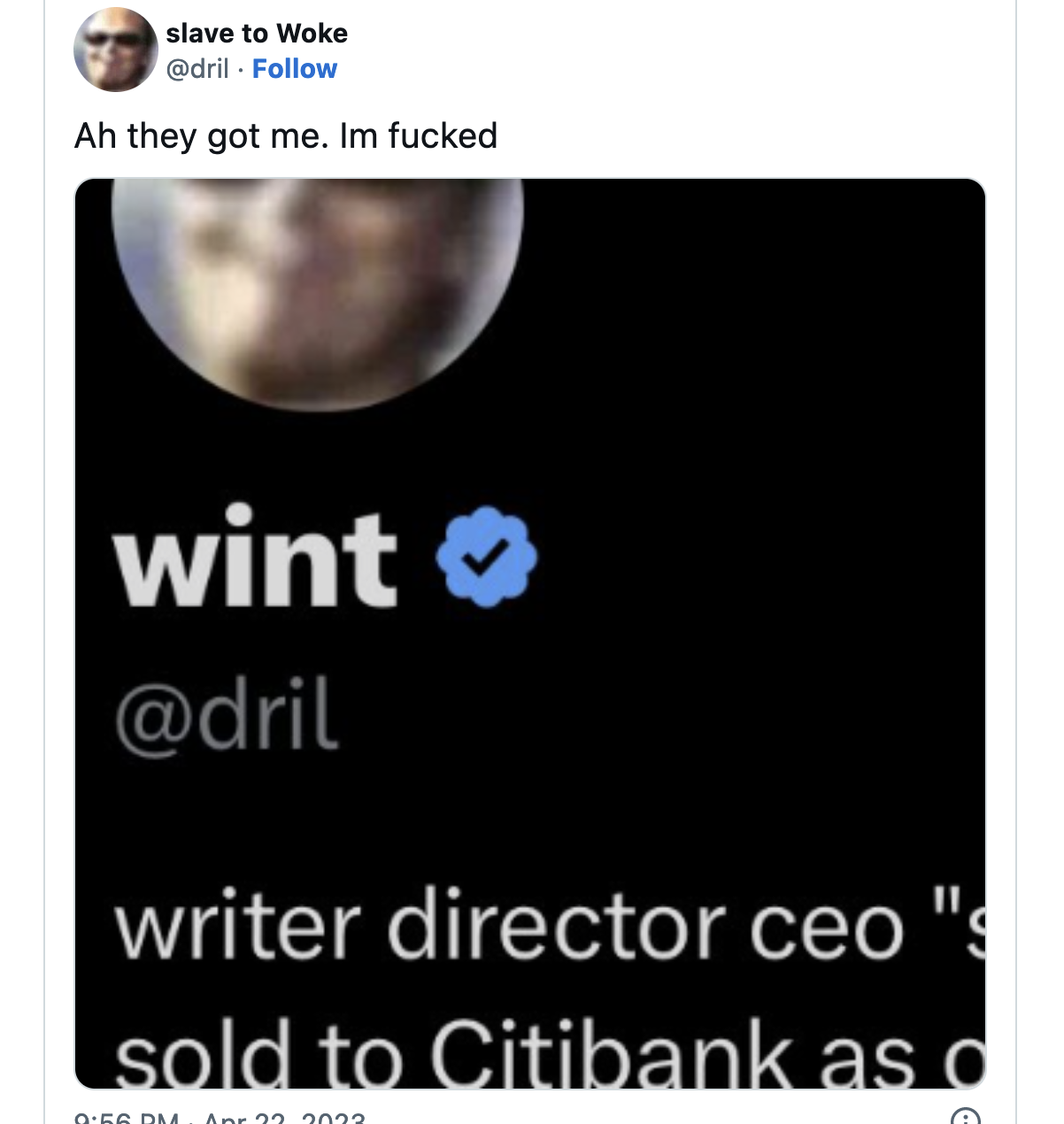The Gist: "My superpower is not knowing"
Twitter devolves into a battle between the man who owns it and the users who owned him. This is the Gist.

This weekend saw the sort of clash usually reserved for the climax of Godzilla films, as Elon Musk's Twitter (and, at this stage it is hard to seperate the dancer from the dance) implemented its long threatened Blue Tick Apocalypse. In removing the sign of authenticity from everyone from the Pope to Stephen King, Musk thought he could make them all buy it back for a monthly fee. Instead, it was shunned by celebrities and found its audiences amongst scammers and nazis.
In response, Twitter's apex account, @dril, who has evolved to understand the platform in a way its owner never could, urged everyone to just block everyone who paid Twitter the $8 tick-tax. The BlockTheBlue hashtag ran riot.
Romulans in the Neutral zone
This all seems like a report on a space battle between warring Star Trek aliens if you're not plugged into the ins and outs of Twitter. And yet, because of the outsized impact social media, and the internet in general, has had on societies and individual lives, what happens there does matter to us all, when it goes to the heart of how it will work.
Twitter's owner is a billionaire. He's in the top three richest people on the planet. He lost $12 billion in net worth this week (his big rocket exploded, his car firm is saggy and his social media network is, well, it's Twitter). But he's still got more money than could be spent in a lifetime of bad decisions.
@dril is an account written by a guy who sometimes has a show on a small tv network and who hopes to make a modest living from writing.
This shouldn't even be a clash. And yet, the two sides are really a proxy battle between whether social media's users (team @dril) own their own spaces or whether those platforms own them.
In miniature, this is a version of the fight to decide the future of social media. In all liklihood, it ends with a sort of mutually assured destruction. The platform falls as it collapses into the sewer of hitler-fan accounts and the communities who formed on it dissolve or decamp elsewhere, lessened.
But in the meantime we should not underestimate the free entertainment of seeing a billionaire, a person with literally no worries that aren't self-created, going into meltdown in the face of teasing from the man who once warned his followers that "if your grave doesn't say 'rest in peace' on it you are automatically drafted into the skeleton war".
This is not my beautiful house, this is not my beautiful wife
Things took a new turn by Saturday, when it was clear that the the threat of removing Blue Ticks from celebrities had not, as intended, provoked them all to start paying, but had instead turned the Blue Tick into a plague mark, a sort of badge of social stigma. The Scarlet Letter, but with a monthly payment.
Seeing its one commercial idea fail, Twitter's shrivelled animating spirit thought to itself "If @dril argues that everyone with a blue tick should be blocked on sight, how would he like it if he had a blue tick?"

Free Advertising?
Now, this is a bit interesting, because Twitter's offices for EU data protection purposes are in Dublin. And so Twitter International Unlimited Company, with its office at One Cumberland Place, Fenian Street, Dublin 2 is processing @dril's data in the EU, with the Irish Data Protection Commission as its regulator and the Irish courts as jusicial oversight. The DPC, for example, fined the company €450,000 in 2021, mostly for reporting a data breach a few days late.
But @dril never looked to have his data processed for the purposes of showing a new blue tick. He didn't want one (and over the course of the next few hours he would repeatedly shake it off by changing his name, only to have some poor soul in Twitter manually stick it back on him. Like the old Loony Tunes "Duck Season, Rabbit Season" sketch, except one party is both Daffy Duck and Elmer Fudd and so keeps shooting itself in the face).
As the hours passed, it turned out that he wasn't the only one receving a blue tick unasked and unwanted. Celebrities, Nobel Prize-winning journalists and even the Auschwitz Museum all rushed to confirm that they hadn't paid the tick-tax.
Processing personal data requires a legal basis under Article 6. According to the Blue Tick info box which is now appended to each account, Twitter Blue account owners have had their telephone numbers verified (and have paid Twitter).

Processing data by a body inside the EU, means that data must be processed in line with the GDPR. So, although @dril, Stephen King, Paul Krugman, Lil Nas X and so on live outside the EU, they can all complain to the Irish regulator for the price of an email. ( info@dataprotection.ie ).
Or, if they felt like it, they could take court cases citing the precedent of Tolley v Fry [1931]. The Defendants, owners of a chocolate company, advertised their products with a caricature of the Plaintiff, a prominent amateur golfer, without his agreement. It was held by the House of Lords that the implication of an endorsement was defamatory (with thanks to Fergal Crehan for the reminder)
Or they could complain that claiming they had signed up for a socially stigmatised software product was an attempt to save it by rubbing some of their glamour onto its saggy, malodorous carcass. This is the common-law concept of passing-off, or false endorsement. The leading case on this is the UK Court of Appeal's Eddie Irvine v Talksport. This awarded the F1 driver £25,000 for an advertising leaflet with a photo doctored to make it appear that he was endorsing a particular radio station.
Multiplied by the thousands of celebrities who had a Blue Tick pinned back on them without asking, claiming they had subscribed, and you're looking at something rather more than $8.
In the end, the tragedy of the fight over Twitter's soul is that it was lost at the outset when it was created as a privately-held centralised platform. Musk's antics have just revealed how unsuitable that model is for a public forum.
The future, however clunky or slow we are getting there, is to build communities on open protocols not platforms. That way, nobody owns them so nobody can buy or sell them. Mastodon and its fellow Fediverse of apps are built on the open protocol ActivityPub.
Regardless of the outcome of the Blue Tick Battle, in the end Twitter is in a war with the future it has already lost.



